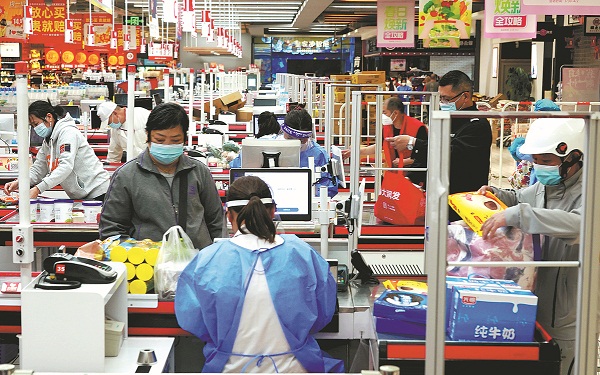
Residents shop at a supermarket in the Jiading district of Shanghai on Monday. It's the first time for people living nearby to go shopping since their lockdown in March. [Photo by Gao Erqiang/China Daily]
Governments, communities and major State-owned enterprises are helping people with special needs-especially seniors living alone, the sick and the disabled-to tide over the recent COVID-19 resurgence in Shanghai.
According to Shen Min, deputy director of the Shanghai bureau of civil affairs, these particular groups face more challenges amid closed-loop management. The bureau and related departments are improving the job of taking proper care of these people through prioritizing a three-pronged strategy including complete acknowledgement of their difficulties and appeals, a timely response to the shortage of daily supplies and delivery to their doorsteps.
Seniors account for a major part of the vulnerable. Bureau statistics show that about 120,000 seniors aged 80 or above were living alone in the city during the lockdown in April.
Shen said that the city has opened hotlines for elderly care services in each district, with personnel on duty around the clock. Volunteer teams have been established in the community to collect their appeals and needs.
"For those difficulties that even the district-level departments are unable to solve, major SOE companies will arrange help," Shen added.
State-owned enterprises such as Bailian Group, which was designated by the government to solve the living problems of vulnerable groups, opened hotlines and WeChat services for people over 80 or those with disabilities living alone.
On April 23, its subsidiary Lianhua Supermarket Holdings received a call from a resident in Hongkou district saying that her 103-year-old father needed to eat nutritious and easy-to-swallow food, such as biscuits. The call was immediately transferred to the nearest Lianhua supermarket and its manager Lu Zhiwei sent biscuits and milk within three hours.
The company also opened a text message channel for the hearing impaired.
As of April 26, more than 4,500 people had consulted and sought help from the company, said Zhao Ling, director of the marketing center of Lianhua. Among them, 50 percent were people with disabilities, 40 percent were seniors living alone, and the rest were people with extreme difficulties, including seniors with chronic disease.
"Receiving calls for help from citizens is the first step, and subsequent supplies and logistics must be guaranteed," Zhao said. "We will strive to deliver goods within two to three days."
Wang Xing, manager of Lianhua Supermart's Taopu branch, said that in addition to ensuring the needs of surrounding residents, the store has been serving a nearby nursing home since April 1, specifically providing supplies for the elderly.
Since April 21, a project initiated by Shanghai Charity Foundation has distributed about 120,000 packages to seniors older than 80 who live alone, including suitable food such as bread, milk, cereal, and special supplies such as adult diapers.
The society has also played a role helping disabled people.
Twenty employees with varying degrees of visual impairment are living inside a massage business on Changshou Road, Putuo district, to comply with epidemic prevention and control requirements. Online shopping is difficult for them.
After manager Hu Ping asked the nearby neighborhood committee for help, vegetables and supplies were sent to the needy employees the next day.
"Our business is located in a commercial area, which is not inside the residential community. Generally speaking, it is not necessary for the neighborhood committee to help us. But they did it immediately after hearing about our situation," Hu said.
In Yangpu district, 13 visually impaired staff living in a massage business have received daily necessities such as rice, eggs and vegetables from Shanghai Disabled Persons' Federation every week, according to Xinhua News Agency. The federation also included them in shopping groups in a nearby community to help them buy supplies.
So far, the federation has helped 445 visually impaired people, providing them with what they need most amid the epidemic, Xinhua reported.

